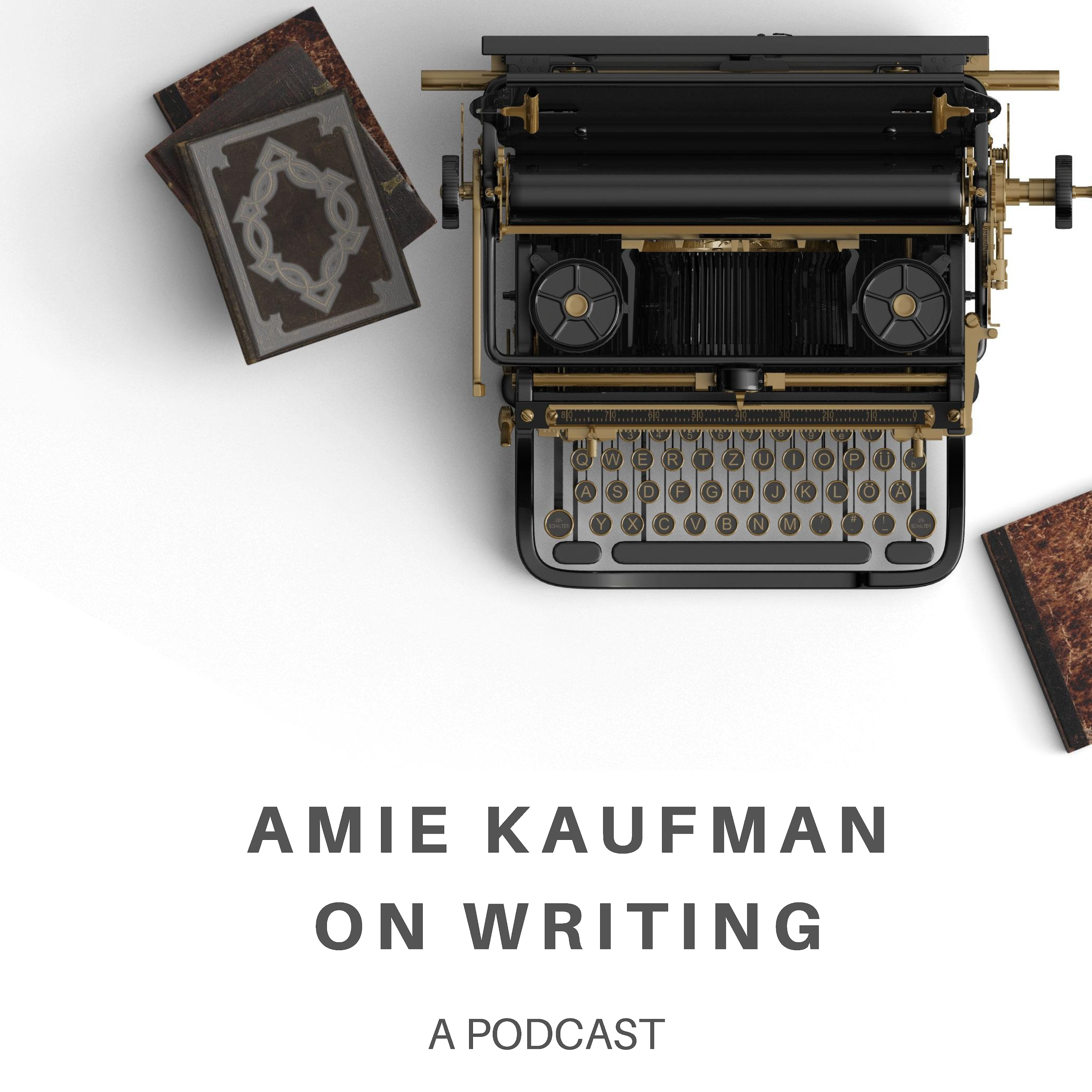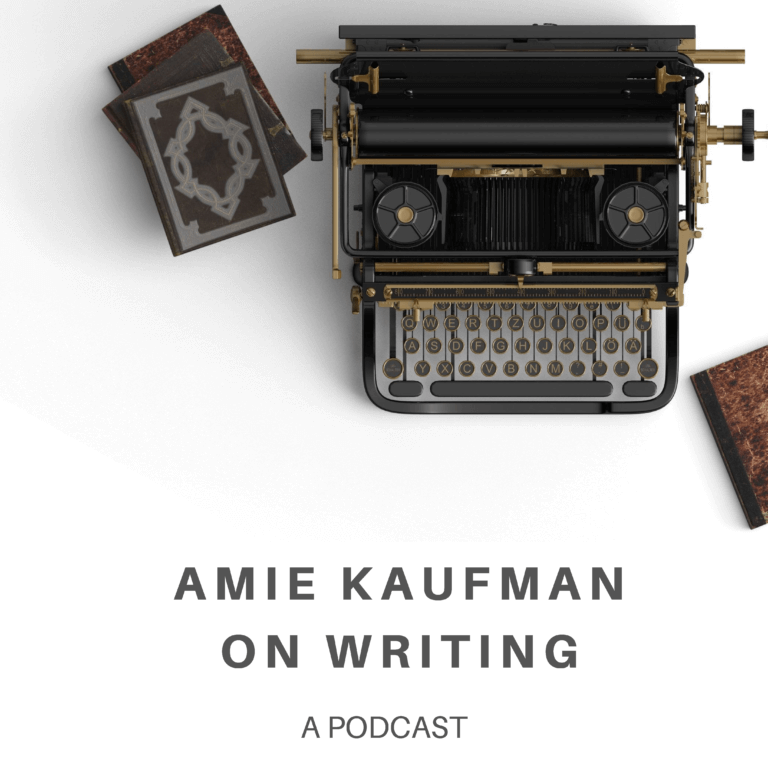Episode 3: Sharing Vulnerability in Your Writing

New York Times and internationally bestselling author Amie Kaufman answers one question each week about writing craft. Full of practical tips and an exercise each week, this is a show for writers, for readers who want a backstage look at how their favourite authors craft their stories, or for creative writing classrooms.
When I think about writing from the deepest parts of myself – something I’ve done often – I always think of an incredible spoken word poet called Abe Nouk – his surname is spelled Nouk, if you want to look him up – who I once saw speak at a conference. He said, ‘Do not be afraid to reveal yourself to your pen.’ And I wrote that down, took it home, and it’s been pinned up in my office for all the years since. You make the biggest impact on your readers when you share yourself, but it’s not easy to do. Usually I offer a series of tips on how to tackle the week’s issue, but today I just want to talk about my experience of sharing my own vulnerabilities on the page, and why it matters so much.
You can find a transcript of this episode at my website, where you can also subscribe to my newsletter, get behind-the-scenes peeks at how I write, and any other news about new books, events or the podcast. You can also submit a question for the podcast on my website. You can find me on Twitter or Instagram.

FOLLOW ON APPLE PODCASTS . FOLLOW ON SPOTIFY . FOLLOW ON OVERCAST . FOLLOW ON PODCAST ADDICT
Season 2, Episode 3: Sharing Vulnerability in Your Writing Transcript
Hi, my friends.
Welcome to Amie Kaufman on Writing, a short podcast that answers one question each week about how writers do what they do.
If you’re a writer, or you’re a reader interested in how your favourite authors craft their stories, then you’re in the right place.
This is Season 2, Episode 3: Sharing vulnerability in your writing.
Here’s my friend and producer Kate with this week’s question. Hi Kate, how are you?
Hi Amie, I’m good!
This week’s question is from Fiona, who says: Can you do an episode about writing things that make you feel vulnerable? Things that are personal, and that you want to share, but aren’t sure if you should?
Hi Fiona, and thank you for asking this. I think it’s important.
When I think about writing from the deepest parts of myself – something I’ve done often – I always think of an incredible spoken word poet called Abe Nouk – his surname is spelled Nouk, if you want to look him up – who I once saw speak at a conference. He said, ‘Do not be afraid to reveal yourself to your pen.’
And I wrote that down, took it home, and it’s been pinned up in my office for all the years since.
You make the biggest impact on your readers when you share yourself, but it’s not easy to do. Usually I offer a series of tips on how to tackle the week’s issue, but today I just want to talk about my experience of sharing my own vulnerabilities on the page, and why it matters so much.
One of the first times I remember doing this is in These Broken Stars with Meg Spooner. I wrote a scene in which a character is grieving, and to do it, I tapped directly into the moment I was sitting in a hospital corridor, waiting to hear if my father had been successfully resuscitated. Everything slowed down. I had time to notice every mundane detail around me, as if all of them were incredibly important. The scuffs on the floor. The place where my shoelace was wearing thin. I don’t know if it was a survival instinct, showing me everything in case I could use some part of it to escape the stressful situation I was in, or if I was trying desperately to escape the other things I could have been thinking about, but I’ll never forget what it was like. And I wrote it down.
I wrote that chapter in one sitting, and it was the only part of the book that was never changed in edits.
Years later I was working on the Illuminae Files, and – don’t worry, this isn’t a spoiler, it’s something that happens a lot in this series – in book two a character loses a family member who’s important to them. That character then appears in book three of the series, Obsidio, and in the time between our writing Obsidio and our editing the book, that same thing happened to me. My father passed away.
And I looked at this book we were writing, and I realized I had it all wrong – this character wasn’t just running around, participating in action sequences. She was devastated. And that had to show up. Anything less was totally disrespectful.
I talked about this with my co-author, Jay. I told him about the way I’d be walking down the street and catch sight of a silhouette, and for a moment I’d think it was my dad, and then I’d remember it couldn’t be, and it never would be again, and my heart would ache. I told him about a feeling I’ve since learned often comes with grief – the feeling that if you can just push through it, be good, take care of people, do everything you’re meant to, somehow there’ll be some kind of reward at the end. That it will be over. That however nonsensical it is, the person you’re missing will be back. And about those moments when you realize that’s not true, and how badly it hurts. About how unfair it is, to lose someone you love.
And he said: If you can, I think you should talk about that in the book. And I did.
I’ve put other parts of myself into books as well. In Ice Wolves, Anders is full of doubts – he doesn’t feel like he’s well-equipped to be the hero of any story. He wants someone else to make the big decisions. He worries he’s messing it up all the time. And when it came time to put those feelings of his on the page, I reached for my own. I sat there, wondering if I could ever be good enough to write this book, if I could make it do all the things I wanted it to do – don’t ever let anyone tell you writing middle grade books is simple – and I pinned down how those uncertainties felt, how they chipped away at me, and I voiced it.
When we do this – share our vulnerabilities with our readers – we tell them they’re not alone. We tell them they’re not the only one who’s felt that pain, or that fear, or that embarrassment, or that anger. And knowing you’re not alone can mean a great deal. It can change lives.
I’ve had readers come up to me at events and tell me that they’re sorry for my loss – because they know without asking that I’ve lost a member of my family. The reason they know it is that they’ve seen their own feelings on the page. Sometimes they talk about the relief of knowing someone else understands what it’s like. Sometimes they talk about how it feels, to know they’re not on their own. And sometimes readers talk to me about the smaller things – about realizing maybe they’re not the worst, that they’re not the only one who’s ever felt that kind of embarrassment, or wondered if they’ll ever know what they’re doing.
Books have done this for me, as well, of course – it’s how I knew I should share myself in the first place. It’s when you do that – when you get naked on the page, if you will – that you impact people the most. You can trust your readers with your vulnerabilities, because you know theirs, too.
Sometimes it’s difficult to know whether something’s yours to tell – if you’ve lost someone, then other people lost them too. Will your telling impact them? But for that question, I turn to Liz Gilbert, who says that if something happened to you, it’s your story. It’s all right, to talk about what’s happened to you, and the way in which you experienced it.
You never have to, of course. If there are parts of yourself that you want to keep just for yourself, either for now or forever, that’s exactly what you should do. We never owe our softest parts to anyone, in our art or in our life. We never owe others our experiences. But if it’s a choice you’ve been hesitating to make, but you think you’d like to, then know that it can make a difference.
Here’s this week’s exercise: Find a quiet moment to sit down, to put your phone away, and to write uninterrupted, even just for a quarter hour. Don’t spend too much time thinking about it before you begin. Think about a moment when you felt deeply – having just come through 2020, I feel confident you won’t be short of examples – and just begin to write. Just describe it. You don’t have to share it with anyone, but… you might find you want to.
That’s it, for this week. Next week, I’ll be answering a much lighter question about writing animal companions.
In the meantime, I’ll remind you to subscribe, and leave the podcast a review wherever you listen. Both these things help new readers find the podcast, and I really appreciate it.
You can find me at my website, which is at amiekaufman.com – you can subscribe to my newsletter there, for behind-the-scenes peeks at how I write, and any other news about new books, events or the podcast. You can also submit a question for the podcast on my website. You can find me on instagram at @AmieKaufmanAuthor or on twitter at @AmieKaufman. This podcast is produced by the lovely Kate Armstrong, host of one of my favourite podcasts, The Exploress, which time travels through women’s history one era at a time. You can find her at theexploresspodcast.com.
For now, thanks so much for listening – enjoy your reading, and enjoy your writing.
Have a Question?
You can submit your question using the form using the form on the main podcast page — if you’re stuck on one aspect of your work, or you’re wondering how your favourite author pulled something off, we’d love to hear from you!
